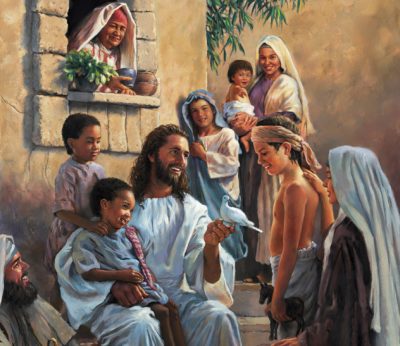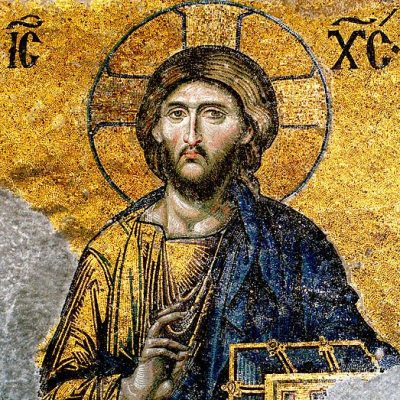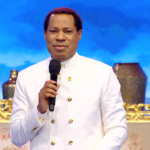Liturgical Readings for : Friday, 1st November, 2024
November First – Solemnity of All Saints
Disciples of the Lord sanctified by the Lord, now in glory
FIRST READING
A reading from the book of the Apocalypse 7:2-4. 9-14
I saw a huge number, impossible to count, of people of every nation, race, tribe and language.
I, John saw another angel rising where the sun rises, carrying the seal of the living God; he called in a powerful voice to the four angels whose duty was to devastate land and sea,
‘Wait before you do any damage on land or at sea or to the trees, until we have put the seal on the foreheads of the servants of our God.‘
Then I heard how many were sealed: a hundred and forty-four thousand, out of all the tribes of Israel.
After that I saw a huge number, impossible to count, of people from every nation, race, tribe and language; they were standing in front of the throne and in front of the Lamb, dressed in white robes and holding palms in their hands.
They shouted aloud, ‘Victory to our God, who sits on the throne, and to the Lamb!’
And all the angels who were standing in a circle round the throne, surrounding the elders and the four animals,
prostrated themselves before the throne, and touched the ground with their foreheads, worshipping God with these words,
‘Amen. Praise and glory and wisdom and thanksgiving and honour and power and strength to our God for ever and ever. Amen.’
One of the elders then spoke, and asked me,
‘Do you know who these people are, dressed in white robes, and where they have come from?’
I answered him, ‘You can tell me, my lord.‘
Then he said, ‘These are the people who have been through the great persecution,
and they have washed their robes white again in the blood of the Lamb’.
The Word of the Lord Thanks be to God.
Responsorial Psalm Ps 23
Response Such are the men who seek your face, O Lord
1.The Lord’s is the earth and its fullness, the world and all its peoples.
It is he who set it on the seas; on the waters he made it firm. Response
2. Who shall climb the mountain of the Lord? Who shall stand in his holy place?
The man with clean hands and pure heart, who desires not worthless things. Response
3. He shall receive blessings from the Lord and reward from the God who saves him.
Such are the men who seek him, seek the face of the God of Jacob. Response
SECOND READING
A reading from the first letter of John 3:1-3
We shall see God as he really is.

Think of the love that the Father has lavished on us,
by letting us be called God’s children; and that is what we are.
Because the world refused to acknowledge him, therefore it does not acknowledge us.
My dear people, we are already the children of God
but what we are to be in the future has not yet been revealed;
all we know is, that when it is revealed we shall be like him because
we shall see him as he really is.
Surely everyone who entertains this hope must purify himself,
must try to be as pure as Christ.
The Word of the Lord Thanks be to God.
Gospel Acclamation Mt 11: 28
Alleluia, Alleluia!
Come to me, all you who labour and are overburdened,
and I will give you rest, says the Lord.
Alleluia
GOSPEL
The Lord be with you. And with your spirit
A reading from the holy Gospel according to Matthew 5:1-12 Glory to you, O Lord.
Rejoice and be glad, for your reward will be great in heaven.
Seeing the crowds, Jesus went up the hill. There he sat down and was joined by his disciples.
Then he began to speak, this is what he taught them:

How happy are the poor in spirit; theirs is the kingdom of heaven.
Happy the gentle: they shall have the earth for their heritage.
Happy those who mourn: they shall be comforted.
Happy those who hunger and thirst for what is right: they shall be satisfied.
Happy the merciful: they shall have mercy shown them.
Happy the pure in heart: they shall see God.
Happy the peacemakers: they shall be called sons of God.
Happy those who are persecuted in the cause of right: theirs is the kingdom of heaven.
‘Happy are you when people abuse you and persecute you and
speak all kinds of calumny against you on my account.
Rejoice and be glad, for your reward will be great in heaven;
this is how they persecuted the prophets before you.’
The Gospel of the Lord Praise to you, Lord Jesus Christ.
*******************************
Gospel Reflection November 1 Feast of All Saints Matthew 5:1-12
The feast of All Saints begins the month of November. It is a month when we remember in a special way our loved ones who have died. Whenever we have a brush with death, either because of some serious illness in ourselves or because of the death of a loved one, important questions are often raised for us. We may find ourselves asking,
What is beyond this earthly life?’ ‘What is our ultimate destination?’,
‘What is the path that leads to this final goal of our journey?’
‘In what way should our ultimate destination impact on the way I live my life here and now?’
This feast of All Saints invites us to engage with these questions.
The ‘saints’ referred to in the title of today’s feast are all those women and men who have reached that ultimate goal of eternal life for which God has created us. They are those who have lived in a way that was in keeping with that final destiny. These ‘saints’ are also those who are still with us in this earthly life and who are now living in the way that leads to life eternal. In that sense, the group we call ‘all saints’ embraces both those who are with God in heaven, the ‘huge number’ spoken of in the first reading, and people who are all around us. All three of the readings for this feast speak of our ultimate destiny in different ways. Saint John in the second reading declares, ‘what we are to be in the future has not yet been revealed’. In other words, there is a necessary ‘not knowing’ when it comes to life beyond this earthly life.
Saint Paul is of this same view. In his first letter to the Corinthians, he writes, ‘no eye has seen, nor ear heard, nor the human heart conceived, what God has prepared for those who love him’ (1 Cor 2:9). Yet, this healthy agnosticism about life beyond this earthly life does not stop the writers of the New Testament from speaking about it.
In that second reading, having declared what we ‘don’t’ know about this life beyond earthly life, Saint John states what we do know, ‘all we know is, that… we shall be like God, for we shall see him as he really is’. Elsewhere in his letter, Saint John tells us who God really is. In one of the most profound statements about God, he declares ‘God is Love’. Beyond this earthly life, according to Saint John, we shall see God as Love. The verb ‘to see’ there is obviously being used in a different way to how we see in our earthly, physical body. When the writers of the New Testament speak about what eye has not seen, nor ear heard, nor the human heart conceived, they have to use language drawn from this earthly life, as it is the only language they have. Saint John is expressing his conviction that beyond this earthly life, we will come to experience God as Love. It will be an encounter with Love at its most complete. Furthermore, John declares, this encounter with God as Love will have a transforming effect on us. ‘We shall be like God, because we shall see him as he is’. There is a sense in which, even in this earthly life, we become what we observe. Saint John is suggesting that in seeing God as Love beyond this earthly life, we will become loving in the way God is loving. It could be said that our ultimate destiny is to become fully alive with the life of God, which is a life of Love.

If that is our ultimate destiny, then the path to that destiny is to grow more and more into the loving person we are destined to become. Such growth in love is not just our work. It is ultimately God’s work in our lives, the work of the Holy Spirit, with which we co-operate. At the beginning of that second reading, Saint John calls on us to ‘think of the love that the Father has lavished on us, by letting us be called God’s children’. As we think of God the Father’s lavish love for us, as we open our hearts to that love, we are empowered to become more loving, more alive with God’s life of love, the life of the Spirit. The beatitudes which Jesus speaks in the gospel reading are his portrait of this loving person, the disciple who is on the way to becoming as loving as God. Such a person will have something of the gentleness of Christ, will reflect his merciful love to others, will mourn over our broken world and will work to bring God’s justice and peace to that world, even if it means being persecuted in the process. Such a person will do all this out of a poverty of spirit and a purity of heart, recognizing their dependence on God for everything, and seeking God’s glory in all things rather than their own glory. This is Jesus’ portrait of the living saint. We might recognize such saints among us; we might even occasionally catch a glimpse of such a one when we look into the mirror! To those who are seeking to grow into this portrait of the saint, Jesus promises the gift of the kingdom of heaven, which he variously describes in those beatitudes as being comforted, being satisfied, experiencing God’s mercy and seeing God.
___________
The Scripture Readings are taken from The Jerusalem Bible, published 1966 by Darton, Longman and Todd Ltd












